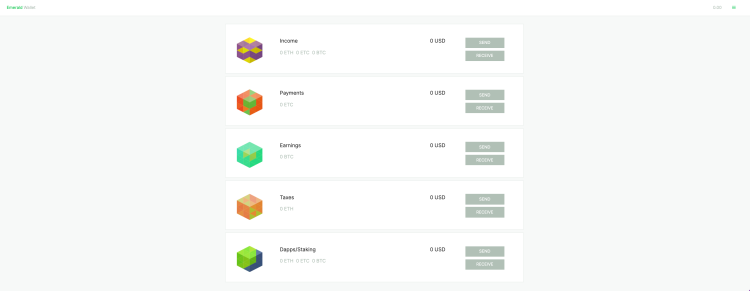Tutorial: How to organize your account plan using multiple wallets on Emerald.
1. What Is an Account Plan?
An account plan is a system where you use your financial accounts to separate your money in categories to organize your finances more effectively.
Millions of individuals, households, self employed, and small businesses worldwide conveniently use this system to manage their money.
In this tutorial we will present an example for local or community crypto exchangers.
2. Multiple Wallets on Emerald
First, let's start by explaining that Emerald supports multiple wallets. This means you can create your first wallet when you download Emerald (there are different ways of creating accounts explained in our other tutorials) and from there you can create more wallets at your convenience to manage your money in categories.
Below is an example of several wallets created using Emerald Wallet.

The cool thing is that you can actually name your wallets whichever way you want, so it is most convenient to manage your finances!
3. Example of a Local Crypto Exchanger Account Plan Using Emerald
For example, a crypto exchanger; who is usually an individual or small business that provides crypto exchange services as a side business in local currency for their friends, family, and local communities; may have the following account plan:

In this case, our subject is a notary public and also has a side business as a local crypto exchanger.
The logic of this account plan for a notary public and a community crypto exchanger side business is the following:
a. Notary Business Account
A convenient way to separate and keep track of the main business of a notary public who is also a community crypto exchanger is to have a wallet just to receive the revenues of his traditional business. In this case, the notary public created an account specific to his notarization activity.
b. Crypto Exchange Account
In a separate wallet, labeled, say, "crypto exchange account," the crypto exchanger may direct his clientes to send him the crypto tokens when he is buying and from where he sends them crypto tokens when they buy in exchange for physical cash. This is convenient as the transaction volume and movements in this account will be completely separated from the main business, which makes it easier to track and segregate.
c. Taxes
As is common, all individuals and small businesses need to account for and go accumulating the money that would go to pay taxes when tax season comes. For this, it is convenient to create a "taxes" wallet to segregate and go moving the estimated amounts to cover future taxes.
d. Personal Expenses Wallet
Many sole proprietors and small businesses mix their personal money with the business cash flows and this may get confusing. A solution to separate and keep track of the personal side of expenses is to create a "personal expenses wallet", so all payments in that category are made from there.
e. Business Expenses Wallet
For the same reasons as above, it may be convenient for local crypto exchangers who may also have a main business to segregate their business expenses in a separate wallet so they can maintain their accounting organized.
Another useful feature of doing the above is that business expenses are usually tax deductible, so paying for them from a distinct account helps in keeping track of those deductions when tax season comes.
4. Watch More Examples!
For more examples of account plans that may adjust to your personal needs, please watch this video:
Thank you!
//

